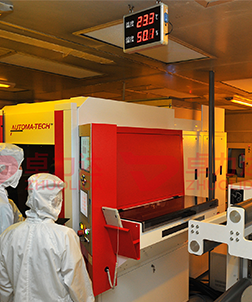
Precision etching and laser processing are two different manufacturing processes, the main difference between them being the energy source used and the process. Below we will compare these two processing methods from several key aspects.
1. Process flow: precision etching is a traditional manufacturing method, mainly including pre-treatment, plate making, etching and post-processing steps. This process is relatively complex and requires a lot of manual operation and time. In contrast, laser processing is a relatively simple process that only requires the material to be placed in the working chamber of the laser, and then the material is processed by computer-controlled laser beams. Therefore, laser processing is more suitable for small-lot production and high-precision manufacturing.
2. Production efficiency: Precision etching is usually carried out in large-scale equipment, which can handle multiple workpieces at the same time and is suitable for mass production. Laser processing is usually carried out in small equipment, each time only one or a few workpieces. However, laser processing is usually faster than precision etching and can process a large number of parts in a short period of time. Therefore, laser processing is more suitable for small lot production and rapid prototyping.
3. Depth: Precision etching can control the depth of processing by controlling the time and concentration of the chemical reaction, and can achieve higher accuracy. The depth of laser processing is usually shallow, mainly suitable for surface engraving and cutting. However, laser processing can control the processing depth and precision by controlling the energy density and scanning speed of the laser beam.
4. Fineness: The fineness of laser processing is very high, and can reach the micron or even nanometer level. This makes laser processing ideal for many high-precision manufacturing tasks, such as microelectronics, nanotechnology and optical manufacturing. In contrast, precision etching has a lower level of fineness, but can still achieve a high level of accuracy for many manufacturing tasks.
5. Impact on materials: Precision etching has little impact on the internal lattice organization of the metal and therefore does not change the mechanical properties of the material. The high energy density of laser processing leads to melting and vaporization of the material and therefore has an effect on the microstructure and mechanical properties of the material. This makes laser processing more suitable for some occasions that do not need to consider the mechanical properties of materials, such as glass cutting and plastic processing.
In summary, precision etching and laser processing have their own advantages, according to the specific application scenarios and needs to choose the appropriate processing method. In the manufacturing process also need to be combined with the actual situation and expertise to make specific decisions.
Contact: andy_Lai
Phone: 18938693450
E-mail: yw9@zldsmt.com
Add: Building A3, Huafa Industrial Park, Fuyong Town, Fuyuan Road, Fuyong Town, Baoan District, Shenzhen,China